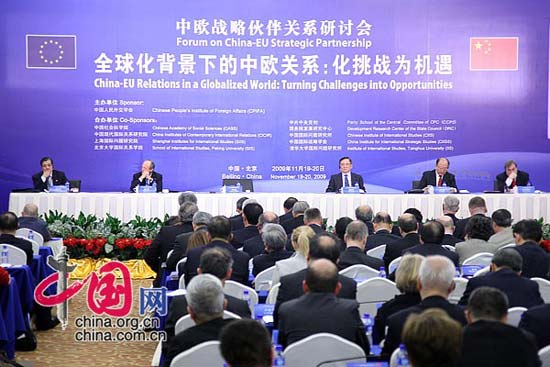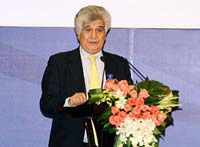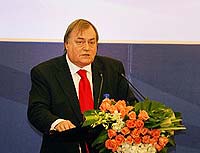Highlights of speeches from Forum on China-EU Strategic Partnership
A Forum on China-EU (European Union) Strategic Partnership, hosted by the Chinese People’s Institute of Foreign Affairs, opened on November 19 in Beijing. The forum is part of China's preparation for the 12th China-EU summit, which will take place in Nanjing, capital of east China's Jiangsu Province, on November 30.
 |
|
A Forum on China-EU (European Union) Strategic Partnership, hosted by the Chinese People’s Institute of Foreign Affairs, opened on November 19 in Beijing.[China.org.cn] |
Initiated in 1998, the summit is the highest-ranking dialogue platform between China and the EU. Premier Wen Jiabao attended the 11th China-EU summit with European leaders in Prague in May.
The forum, held over two days on Thursday and Friday, is being attended by former French Prime Minister Jean-Pierre Raffarin and Hungary's ex-Prime Minister Peter Medgyessy.
Chinese vice-Premier Li Keqiang Thursday called for greater investment between China and the EU ahead of the annual leaders' summit.
He proposed China and the EU upgrade the size and level of investment and trade, and work together more closely on advanced technologies, energy conservation, environmental protection and the green economy.
 |
|
"We have no conflict or rivalry with China: we Europeans want to see a powerful and prosperous China, and it is in China's interest that the EU continues to thrive. The engines of Chinese growth are still going strong; as well as the engines driving European prosperity." -- H.E. Mr. Serge Abou, Head of Delegation of European Commission |
The following are excerpts from speeches made at the forum by senior officials and scholars:
H.E. Mr. Romano Prodi, Former President of European Commission:
The first objective we should set for the future is to expand trade and investment further in an attempt to correct, at least in part and over the long term, existing imbalances, To this regard, we should deepen the dialogue at Vice-President level started in April 2008, and create a "permanent group" whose aim would be to prevent and solve possible controversies in these areas. I see this "permanent group" as a means of facilitating recognition of China as a Market Status Economy, something that would most certainly further improve relations between China and the rest of the world.
 |
|
"The present disagreement between developing and developed countries on binding emissions caps, transition plans, audit, and the need for economic growth, reduced poverty and adequate financing and technology transfers can and must be settled against the principle of common but differentiated responsibility. After all, all countries would be affected by failure to reach an agreement which China and the EU are uniquely placed to prevent." -- Rt. Hon. John Leslie Prescott, Former Deputy Prime Minster of UK |
H.E. Mr. Gerhard Schroeder, Former Chancellor of Germany:
We Europeans must meet with China on equal footing and engage in a fair and trusting dialogue with the country. And let me add that this approach will not tolerate sanctions of any kind. The goal of sanctions is to isolate and discriminate. We must instead strive for cooperation, integration and change. A policy that stresses broad cooperation and the common handling of global challenges is in both, Europe and China's interest. Germany and EU need constructive relations with China- for the mutual benefit of our people and to increase peace and stability.
Mr. James Kynge, Principal, China Confidential, The Financial Times:
I attended a closed-door conference in the UK recently between senior Chinese media officials and their UK counterparts, and the discussion there dwelt almost entirely upon our growing differences rather than the progress we have made in understanding each other. In one wat, I suppose this may be a good thing in a way because "only true friends dare speak the truth". But in another sense, the mistrust that characterizes our media relations is disappointing and harmful to our wider relationship.
Rt. Hon. Tony Blair, Former Prime Minister of UK:
However, the relationship between Europe and China is much more than about business and trade. It is a strategic partnership for the modern governance of the modern world. What that means is this is not just an area for business, but also for security, the environment and how we manage the world economy. In all these areas, the role of China and the partnership between Europe and China is of massive strategic importance.
Prof. Stanley Crossick, Senior Fellow, Brussels Institute of Contemporary China Studies; Founding Chairman, European Policy Centre:
The Chinese model has delivered several hundred million people out of poverty. Contrary to many Western beliefs, this model, despite its shortcomings, has been more effective than, say, the exported American model based on ideology and democratization, with scant attention to the local circumstances. Without the rule of law, a better educated people and a substantial middle class, premature democratization can have adverse consequences. The Beijing Consensus is to be preferred to the Washington Consensus.
Prof. Gustaaf Geeraerts, Director, Brussels Institute of Contemporary China Studies
Simultaneously, China and Europe have to agree on which interests they will build the pillars of their strategic partnership. One of the main setbacks in the EU-China relationship has always been its obsession with dialogues without a common view on how the new world order actually binds them together.
Prof. Kjeld Erik Brodsgaard, Director, Asia Research Centre of Copenhagen Business School:
The way forward for the EU and China must be to insulate the economic relationship from the political sphere. This was the rationale for the US to China's admittance to the WTO in 2001, which abolished the yearly debate in the US Senate on China's PNTR status. Similarly the EU and China should agree on arrangements that prevent negative spillover effects from the political arena. A first step in this direction would be to admit China Market Economy Status.
Prof. Pierre Defraigne, Executive Director, Madariaga College of European Foundation:
Preserving free trade, FDI and technology movements which remain central for global convergence against the backdrop of the crisis: in particular playing the ratchet effect of a successful Doha Round through lowering developed countries' agricultural subsidies and tariffs and doing away with 'the water under the bridge' in emerging and developing countries' tariffs. A successful Doha Round in 2010 would be the most robust insurance against protectionism.
Prof. Francois Godement, Director, Asia Centre, Science Po.:
Financial and monetary cooperation between China and the EU is now essential: neither do we want a massive inflow into Euro reserves, now can we afford another rise of our trade deficit with China which would result from an ever underevaluated renminbi. A countervailing capital flow into Europe's monetary and debt instruments has never been a realist option. But we need to promote shared interest, joint investment in partnerships and between firms to balance the economic and political impact of China-EU trade.
 0 Comments
0 Comments







Comments